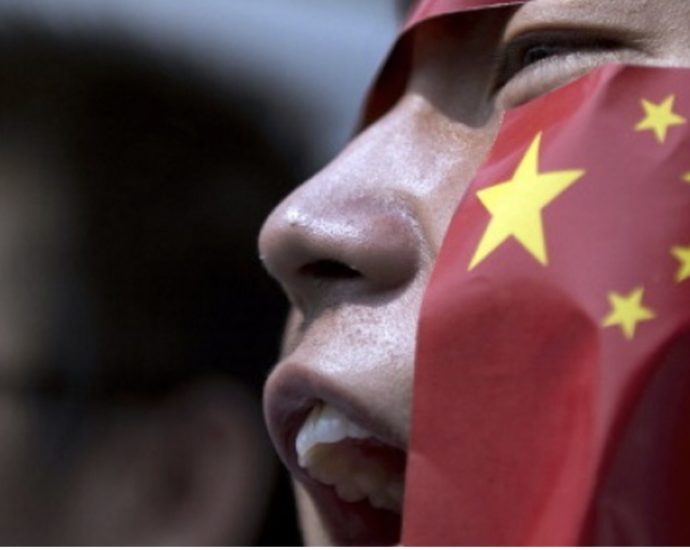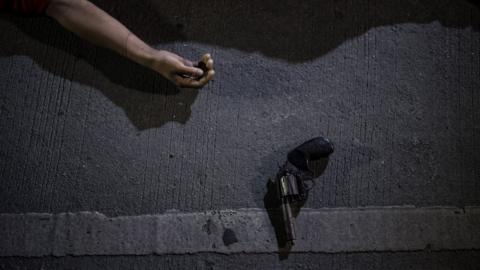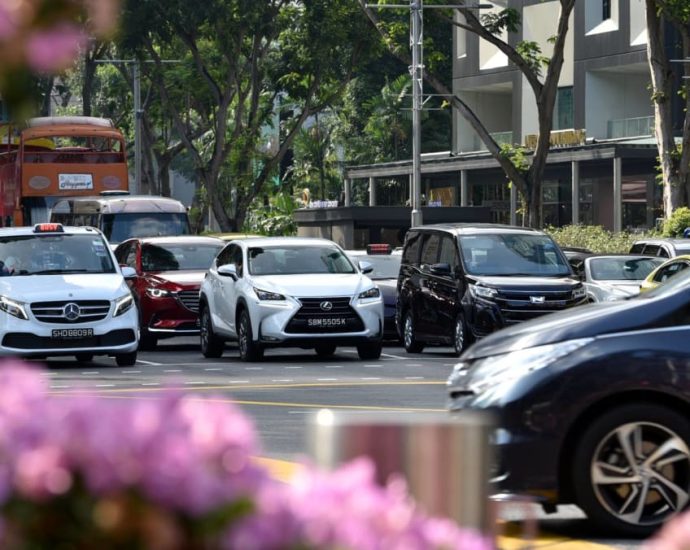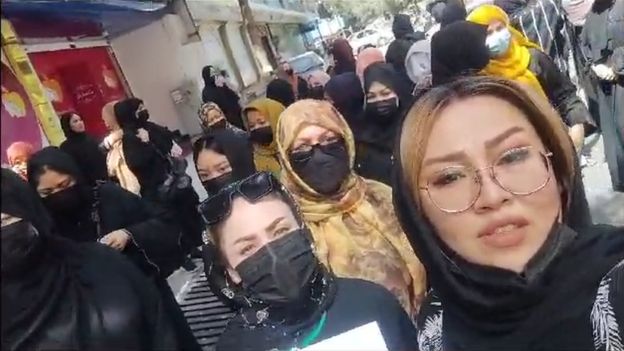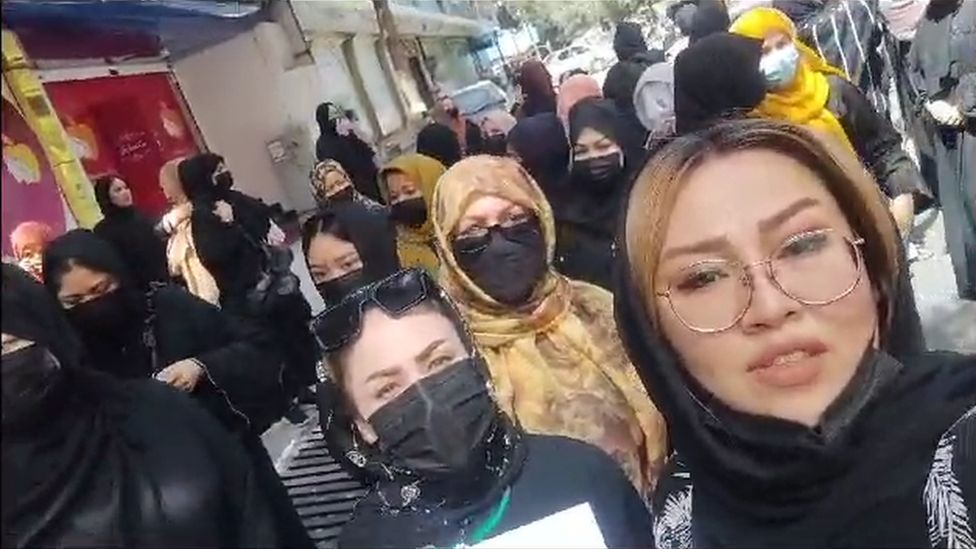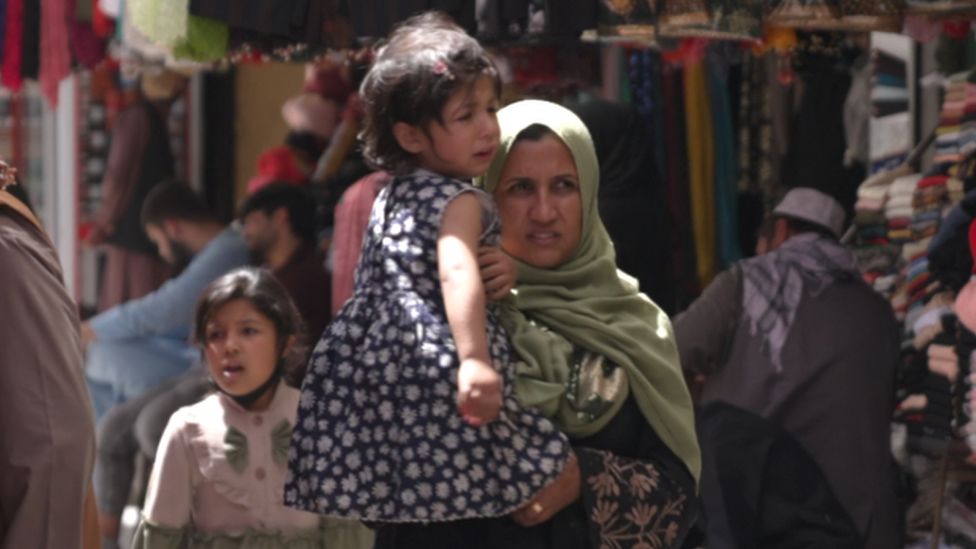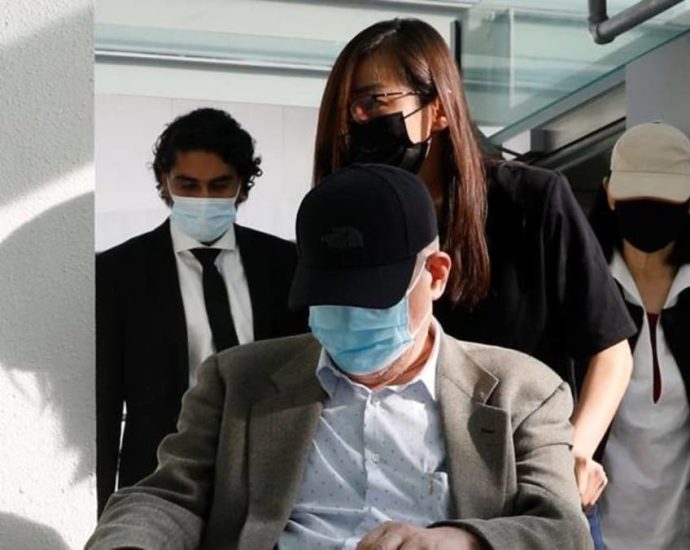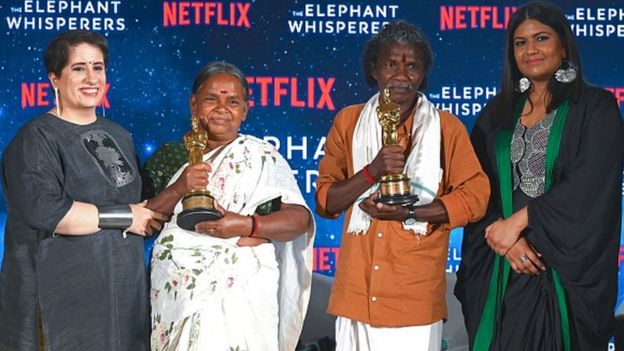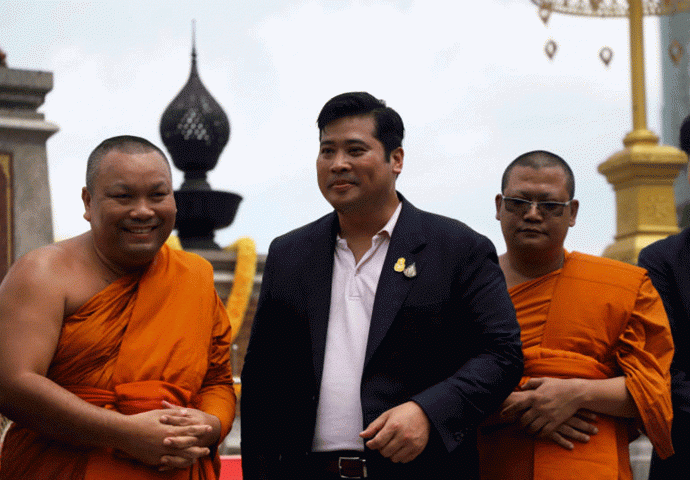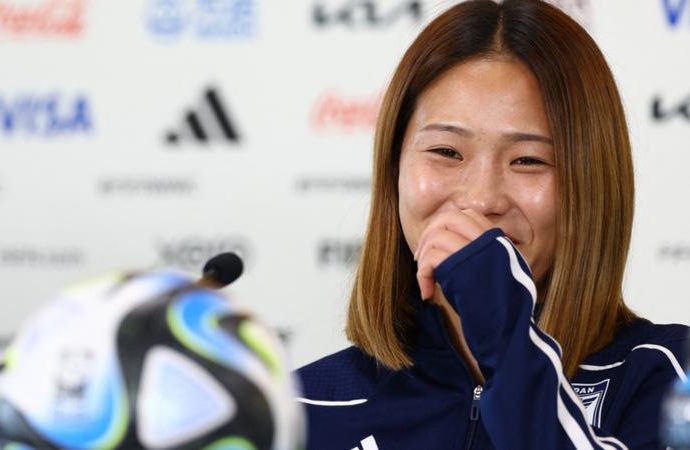Indonesia blocks almost 900,000 online gambling content over five years
JAKARTA: The Indonesian government has blocked access to 886,719 pieces of online gambling content over a period of five years since July 2018, with an expert noting that regulating rather than banning such sites would be more effective. “On average, we terminate access to 1,500 to 2,000 sites and dozensContinue Reading
Why China rarely escalates US provocations
In recent years, there has been a prevalent discourse which suggests that nationalism has emerged as a key driving force behind China’s foreign policy, particularly in international incidents and crises.
But China’s actions on the global stage exhibit a range of responses to nationalism in different incidents – at times embracing it and at other times adopting a more detached approach.
Policymakers, academics and the general public lack a clear understanding of the role Chinese nationalism truly plays. Why and under what condition would the Chinese government choose to escalate as nationalists require in some state-to-state international incidents, but not in others?
When the Chinese government responds to international incidents, its primary concern lies in garnering public support while safeguarding national interests. Policy formulation is significantly influenced by legitimacy concerns, of which economic development and nationalism hold paramount importance.
When decision-makers perceive nationalist sentiments are likely to bring political and social instability, external escalation measures will be taken to safeguard China’s interests and pacify domestic discontent.
For instance, during the Kosovo War in 1999, NATO bombed the Chinese Embassy in Yugoslavia, resulting in the loss of three lives and injuring 27 individuals.
In September 2012, despite repeated warnings from China’s leadership, the Japanese government “nationalized” the disputed Diaoyu/Senkaku Islands. In August 2022, US House of Representatives Speaker Nancy Pelosi visited Taiwan despite China’s strong opposition.

All three incidents damaged China’s national dignity and sovereignty and brought overwhelming nationalist sentiments to the fore — which prompted China to swiftly respond with robust escalating countermeasures.
These incidents caught global attention. But China did not escalate in many other cases. Of course, reacting without escalation does not mean “doing nothing” externally, as appropriate countermeasures targeting the other country in international incidents are expected.
China’s priority in developing its economy explains its rationality and restraint in handling many contentious incidents. After the 1978 reforms, economic development has been the government’s central task. When diplomatic relations hold significant economic value, China strives to handle incidents smoothly to foster active cooperation.
During the 2001 Hainan airplane collision incident, China did not escalate and resumed active dialogue with the United States once its demands were met. In the 2023 “balloon incident”, China again did not escalate against the United States, despite its strong opposition to the US military’s strike.
Even if a diplomatic relationship holds low economic value, escalation is not China’s first choice. Empirical evidence demonstrates that the government will assess whether the incident harms China’s core interests.
If not, it will usually not excessively cater to nationalism. This is because such actions may lead to unnecessary disputes and negatively impact diplomatic relations.
Even if China’s core interests are harmed, reaching an agreement to resolve an issue becomes crucial. During the 2016 South China Sea arbitration case, China initially imposed diplomatic, military and economic sanctions on the Philippines.
But China’s policies began to moderate after the new Philippine president Rodrigo Duterte visited China. During Duterte’s visit, China and the Philippines reached extensive and in-depth cooperation agreements under the consensus of shelving the arbitration, resulting in a significant turnaround in China-Philippines relations.
Canada and the United States’ arrest of Huawei’s Chief Financial Officer Meng Wanzhou in December 2018 was a critical case. During this incident, the Chinese public “rallied around the flag,” leading to increased public support for the government.
China’s relatively restrained response to the United States can be attributed to the substantial economic value of the Chinese-US relationship.
The value of the Chinese–Canadian relationship was not as significant. Meng’s arrest was viewed as part of the West’s technological war against China, posing a threat to China’s core interests. When China and Canada failed to reach an agreement regarding Meng’s release, China took significant diplomatic and economic measures to escalate the situation.
These actions exerted immense pressure on the Canadian government and eventually contributed to the agreement to release Meng and the detained “two Michaels.” This brought an end to this international incident, which lasted for more than 1,000 days.

Contrary to assertions that suggest China blindly caters to nationalism, the reality is far more complex. Unless an international incident threatens political and social stability, China rarely resorts to escalation measures that cater to nationalism.
This is because China emphasizes the economic value of diplomatic relations and, when non-core interests are harmed, China usually refrains from escalating. China also seeks to resolve disputes by achieving agreements it supported.
The Chinese government responds to nationalism with pragmatic actions rather than widely perceived instrumentalist policies – and it is often misleading to exaggerate the role of nationalism in China’s foreign policymaking.
Chenchao Lian is a PhD Candidate in International Relations at the University of Oxford. This article is based on his published research.
This article was originally published by East Asia Forum and is republished under a Creative Commons license.
Philippines: Six officers suspended after shooting teen in Manila
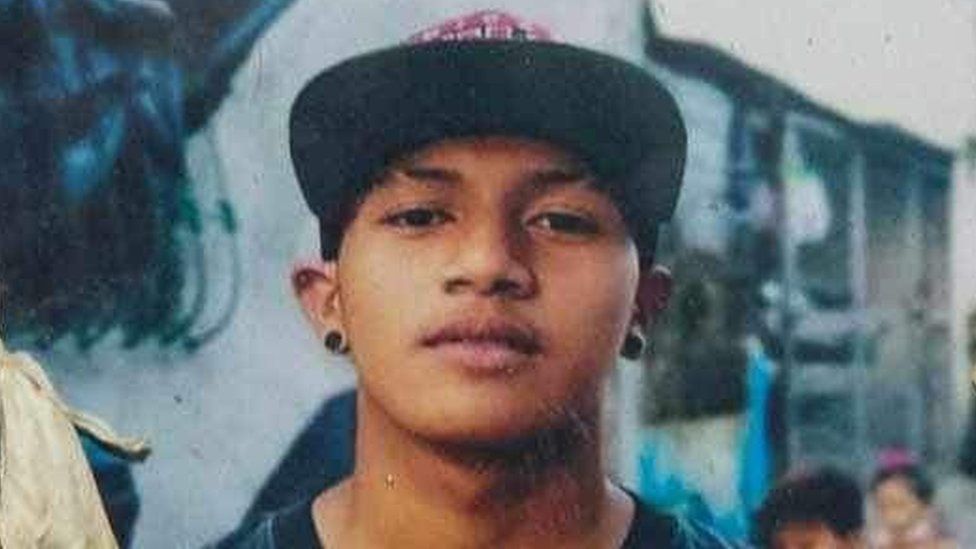 Handout
HandoutSix policemen in the Philippine capital are facing criminal investigation over the fatal shooting of a teenager whom they had mistaken for a murder suspect.
Jerhode Baltazar drowned at a fishing village in suburban Manila after being shot in the head last Wednesday.
He dove into the water in a panic as police attempted to arrest him.
It was a “lapse in judgment” for the policemen to shoot him, given the 17-year-old was unarmed, conceded authorities.
“They cannot invoke self-defence. They were unable to prove that the victim resisted arrest,” Navotas city police chief Col Allan Umipig told local television.
It was not immediately clear what led police to believe the teenager was the person they were after. They had been tasked to arrest a suspect in a separate shooting, which also took place in Navotas.
The six officers have been removed from their posts and detained while authorities investigate whether they could be charged with homicide, which is punishable by a maximum of 20 years in prison under Philippine law.
The shooting has been covered prominently by local news outlets.
In videos posted on social media, the victim’s father, Jesse Baltazar, was shown clutching his son’s body after it was fished out of the water.
Mr Balazar questioned why his son was shot in the head when the policemen had claimed they fired only warning shots.
The victim’s mother, who works in Qatar, viewed her son’s coffin through a video call. She told local TV she never imagined her next remittance would be for her son’s burial.
The victim’s sister, Jeraldine Tolentino, also told local media that she refused a 50,000-peso ($1,000; £698) bribe to discourage the family from pursuing the case.
Law enforcers in the Philippines have in recent years parried allegations of extrajudicial killings of crime suspects, particularly those involved in illegal drugs. They have denied wrongdoing.
Alleged summary executions of suspects who purportedly resisted arrest increased during the reign of former President Rodrigo Duterte, whose term ended in mid-2022. He is facing an investigation by the International Criminal Court, which he has refused to recognise. Mr Duterte is currently living in retirement in Davao City.
Critics say his hardline stance against crime has fostered an atmosphere for police misconduct. He however has defended his signature campaign as necessary for keeping Filipinos safe from street crimes.
Duterte’s successor, Ferdinand Marcos Jr, has dialled down his anti-narcotics campaign. However, state actors have been accused of involvement in high profile killings, such as that of journalist Percival Mabasa in November 2022.
Related Topics
-
-
8 November 2022
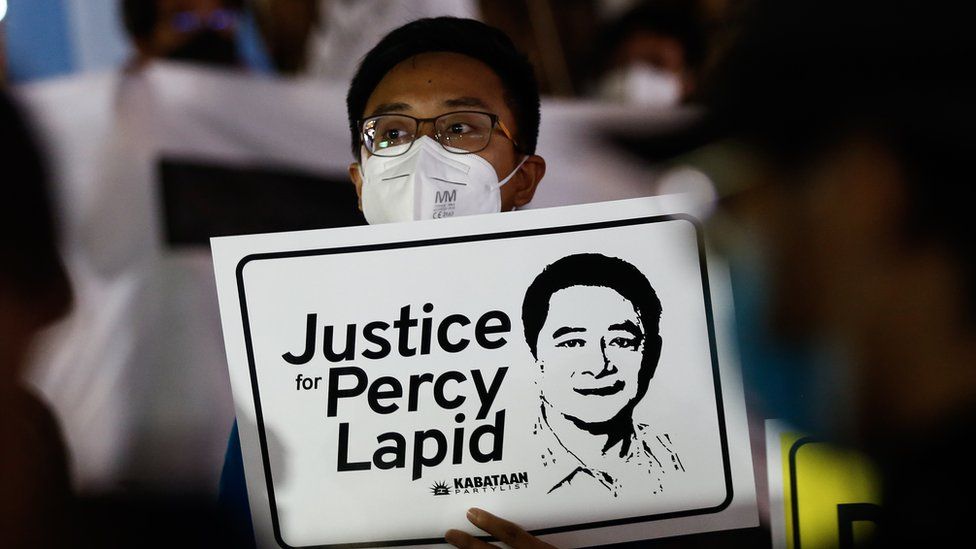
-
-
-
11 June 2021

-
-
-
21 December 2020
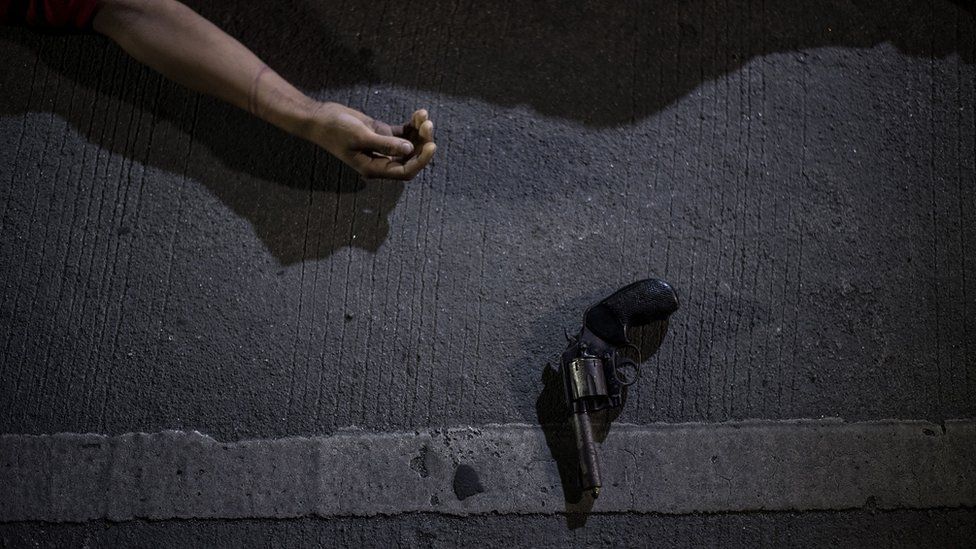
-
COE premiums for Category B, Open Category hit record highs
SINGAPORE: Certificate of Entitlement (COE) premiums for Category B and E hit record highs in the latest bidding exercise on Thursday (Aug 10). Premiums for larger and more powerful cars in Category B rose to S$126,889, from S$118,001 in the last tender. It surpasses the previous record of S$121,000 set inContinue Reading
Taliban repression of women a crime against humanity, says Gordon Brown
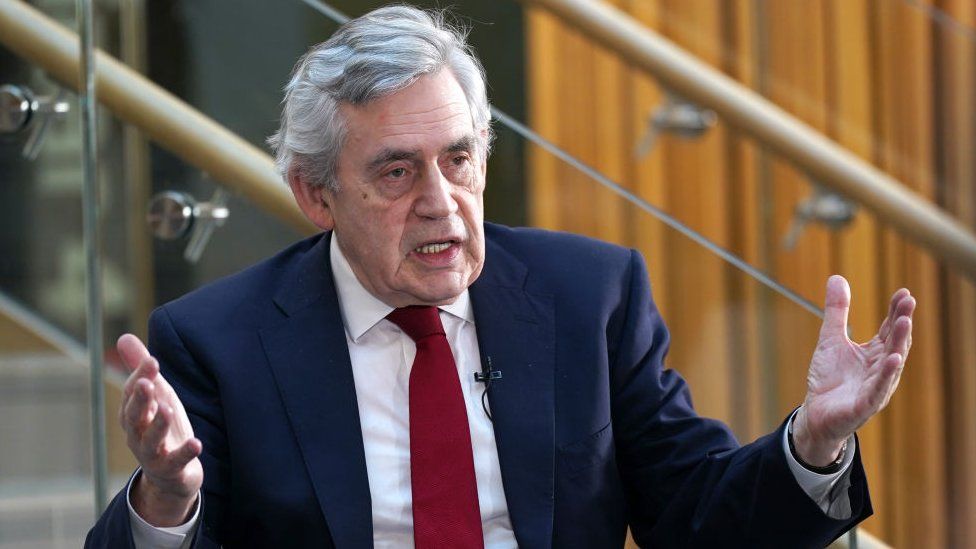 Getty Images
Getty ImagesThe Taliban’s treatment of women and girls in Afghanistan is a “crime against humanity”, Gordon Brown has told the BBC.
The former prime minister is calling on the International Criminal Court (ICC) to prosecute those responsible for the “vicious” abuse of human rights.
The Taliban government has severely restricted the freedoms of women and girls since regaining power in 2021.
“This is the systematic brutalisation of women and girls,” he said.
Speaking to BBC Radio 4 Today’s Nick Robinson, Mr Brown, now the UN’s special envoy for global education, said: “They’ve been excluded from education, excluded from employment, excluded from visiting public places.
“All these bans are a form of discrimination. It’s probably the most heinous, most vicious, most comprehensive abuse of human rights in place around the world today.”
He described the system as a form “gender apartheid” that should be considered a crime against humanity.
“It’s right then for the International Criminal Court, which has responsibility for dealing with crimes against humanity, to both investigate and prosecute those responsible.”
The ex-Labour prime minister, who led the UK from 2007 to 2010, suggested the pressure of a potential prosecution could force the Taliban to reconsider, and said he was shocked by there was “so little international pressure on the regime”.
Mr Brown also called for UK sanctions against the Taliban leadership, and leaders and clerics from Muslim-majority countries to help persuade them that “Islam is a religion that values women and girls”.
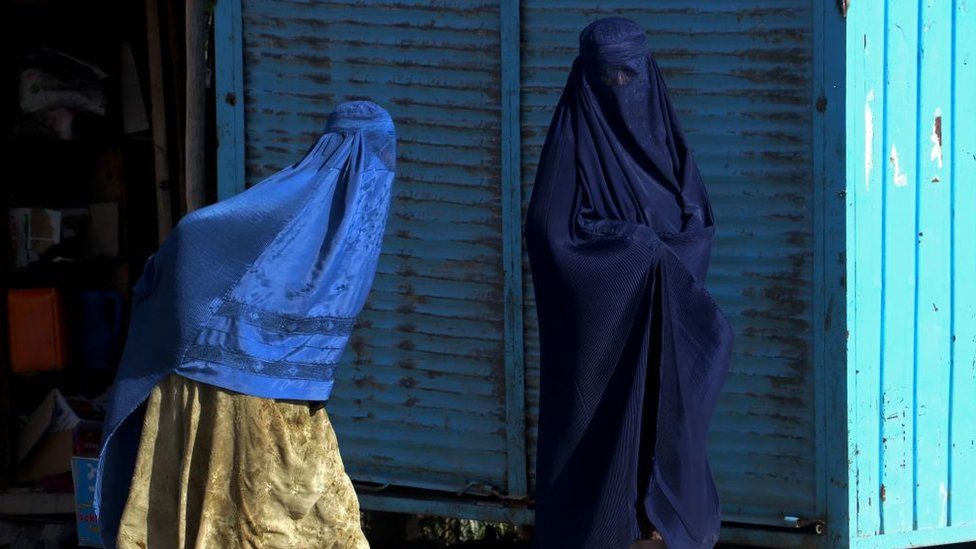
The former prime minister’s intervention comes as the two-year anniversary approaches of the fall of the democratic government and Taliban takeover following the withdrawal of Western troops.
Taliban leaders promised a more moderate rule than during their previous period in power from 1996 to 2001.
Last month Afghan women held a rare protest against the Taliban’s decision to shut female beauty parlours and salons.
Girls have been banned from attending secondary school and women excluded from university.
Women and girls are also prohibited from entering amusement parks, gyms and working in non-governmental organisations, and must adhere to a strict dress code.
The UN has previously said women reported feeling “invisible, isolated, suffocated, living in prison-like conditions”, with many unable to meet and their basic needs without employment or aid.
Related Topics
-
-
18 July
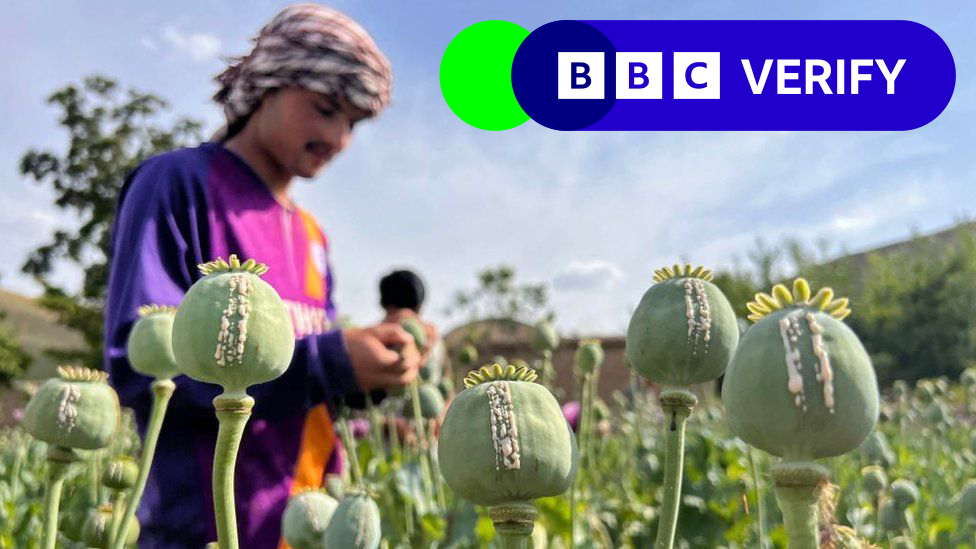
-
-
-
24 December 2022
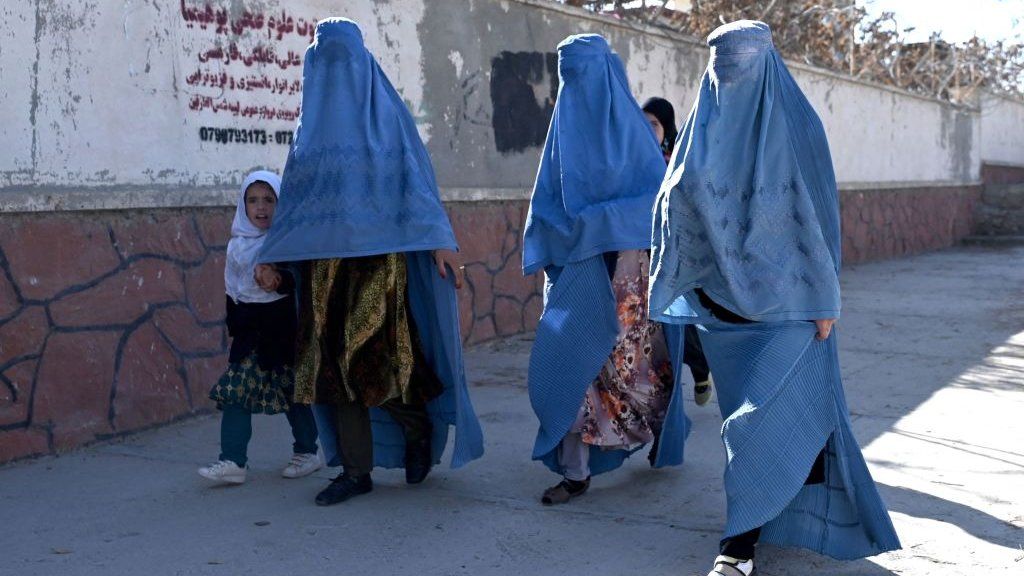
-
-
-
21 December 2022
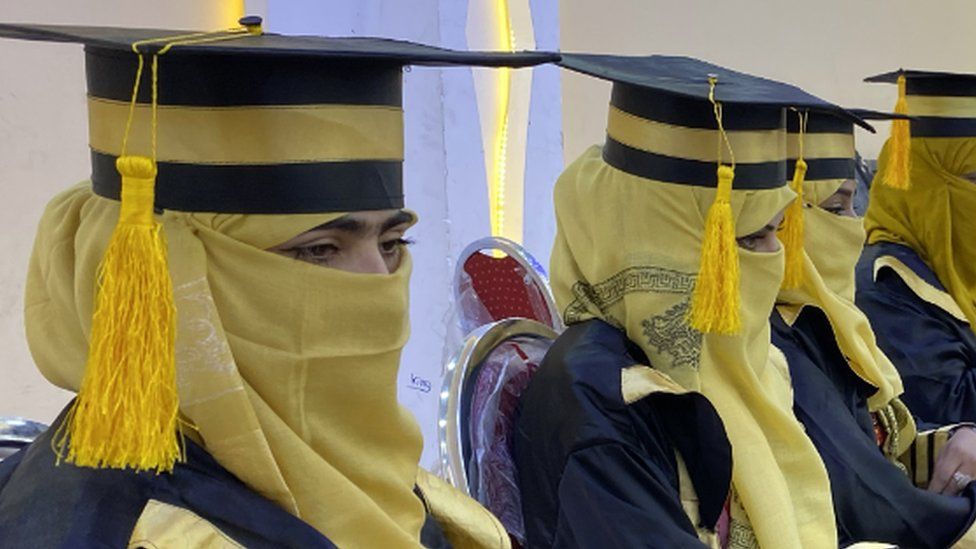
-
-
-
8 September 2021
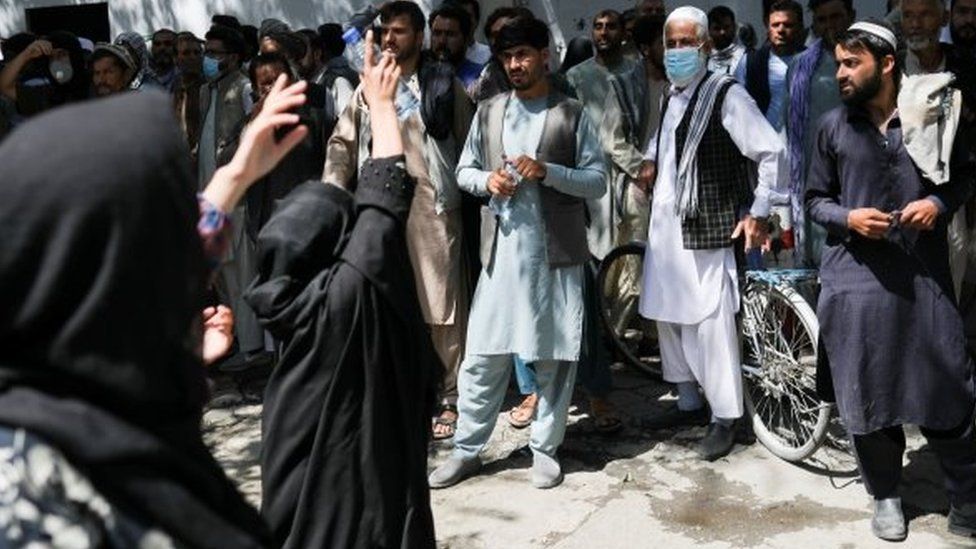
-
‘The Lim family must be held accountable’: Liquidators seek US$3.5 billion from ex-oil tycoon OK Lim

SINGAPORE: Liquidators on Thursday (Aug 10) opened their court case against Lim Oon Kuin, the founder of collapsed oil trading firm Hin Leong Trading, charging that the Lim family must be held accountable for what they say was years of fraud and fork out US$3.5 billion (S$4.7 billion) to pay off the company’s debts.
The 81-year-old former oil tycoon, better known as OK Lim, and his children allegedly tried to portray Hin Leong as a profitable and healthy company to continue obtaining financing, even though the company had been incurring massive losses for years.
The company had suffered about US$808 million in losses from futures and swaps from 2010 to 2020, with the losses allegedly concealed by overstating profits by US$2.1 billion in the same period.
The Lims allegedly deceived banks into extending financing by concealing the true financial state of Hin Leong. The alleged ruses include pledging cargo Hin Leong did not own or overstating the quantity it did, selling the same cargo to more than one party and by using fabricated sales contracts and invoices.
Hin Leong, which is in compulsory liquidation, is seeking an order that Lim, along with his son Evan Lim Chee Meng and daughter Lim Huey Ching, pay US$3.5 billion to Hin Leong. This is the full amount of the company’s unsecured debts as of April 2020.
The liquidators are seeking a declaration that the three Lims are held personally responsible for all of Hin Leong’s debts.
The liquidators are also seeking that the Lim patriarch and his two children return US$90 million in dividends that should not have been paid to them in 2017 and 2018.
Alternatively, they are seeking damages for breaches of fiduciary and other duties by the Lims.
LEAD COUNSEL’S OPENING STATEMENT
Lead counsel for the liquidators, Drew & Napier’s chief executive officer Senior Counsel Cavinder Bull, said in his opening statement that the Lim family had deliberately concealed Hin Leong’s losses and portrayed the company as profitable when it was, in fact, “massively insolvent”.
“They did this through fraudulent and dishonest activity including, among other things, the creation of fictitious gains to conceal accumulated trading and other losses, the forgery of documents, the manipulation of Hin Leong’s accounts through improper accounting entries, the overstatement of Hin Leong’s inventory and the obtaining of financing through improper means,” he said.
Even though Hin Leong had been insolvent since 2012, the Lim family caused the company to continue trading on the basis that it was profitable and to accumulate further liabilities, said the lawyer.
Both Lim children were directors of Hin Leong, with Mr Evan Lim an active trader and his sister in charge of accounts and financing, said Mr Bull.
Not only did the Lim family perpetuate this guise, they also caused Hin Leong to pay them dividends of US$90 million in 2017 and 2018, even though the company had no profits at the time, said Mr Bull.
He charged that the concealing of about US$800 million in losses was done at the instruction of Lim, and he later told employees that he would take responsibility for it.
However, despite initially making admissions over the issue, Lim and his son “sing a different tune” today, denying any fraudulent conduct, said Mr Bull.
Instead, they now point the finger at their employees, he said.
Mr Bull asked the court to consider why “mere employees” who did not stand to profit personally from the fraud would do such a thing.
“What then is their defence?” asked Mr Bull. “First – they refuse to admit anything, even the most basic facts about the financial state of Hin Leong … Respectfully, your honour, they are trying their luck. They are hoping someone will slip up in their evidence.”
“The Lim family must be held accountable for their fraudulent actions,” concluded Mr Bull.
The Hongkong and Shanghai Banking Corporation (HSBC) is also suing the Lims over two applications made with allegedly fabricated documents that deceived the bank into disbursing US$111.7 million to Hin Leong in March 2020.
Lead counsel for HSBC, Senior Counsel Sarjit Singh Gill of Shook Lin & Bok, said it was “diabolical” for the Lims to attempt to throw employees, who were “so loyal to them”, under the bus when it was the Lims who “stood to gain from all these shenanigans”.
Lim is defended by a team of lawyers from Davinder Singh Chambers, led by Senior Counsel Davinder Singh.
His son is defended by lawyers from Damodara Ong LLC, while a team from Advocatus Law represents his daughter.
The opening of the civil case before Justice Philip Jeyaretnam comes as the fallen oil tycoon’s trial for criminal offences is ongoing in the State Courts.
Elephant Whisperers: Indian couple in Oscar-winning elephant film sue makers
 The Elephant Whisperers / Netflix
The Elephant Whisperers / NetflixA indigenous couple at the centre of an Oscar-winning Indian film has sued its makers, alleging mistreatment.
Elephant Whisperers tells the story of Bomman and Bellie as they care for an orphaned and injured baby elephant inside the Mudumulai Tiger Reserve in the southern Indian state of Tamil Nadu.
The Netflix film made history at the Oscars by becoming the first Indian production to win in the Best Documentary Short Film category earlier this year.
And it turned the caretakers, Bomman and Bellie, into overnight sensations. After the film’s success, they were felicitated by Tamil Nadu Chief Minister MK Stalin, who presented them with a cheque of 100,000 rupees ($1,207; £949.4) each, along with a citation.
The two also met Prime Minister Narendra Modi when he visited the elephant camp in April.
But the couple has now sued the film’s director Kartiki Gonsalves and Sikhya Entertainment – the production company run by award-winning producer Guneet Monga – alleging that they were not compensated properly for their participation.
They have sought 20m rupees “as a gesture of goodwill” and said the money would take care of their housing as well as their needs in old age. It’s not clear when the case will be heard but the couple’s lawyers have told Indian media that they would continue fighting.
The filmmakers have denied the allegations. In a statement to BBC Tamil, the director and the producer said they had “deep respect” for all contributors of the story.
Gonsalves, who responded to a message on WhatsApp, added: “All the allegations made by Bomman-Bellie are false, there is no truth in their allegations.”
Shot in the stunning vistas of the Nilgiri mountains, The Elephant Whisperers follows Bomman and Bellie as they care for Raghu, an injured baby elephant who gets separated from his herd.
The couple belong to the Kattunayakan community, a tribal group that has been protecting the forest for generations.
The film was praised for highlighting their efforts at wildlife conservation as it featured moving scenes that showcased the bond forged between the animals and their human caretakers.
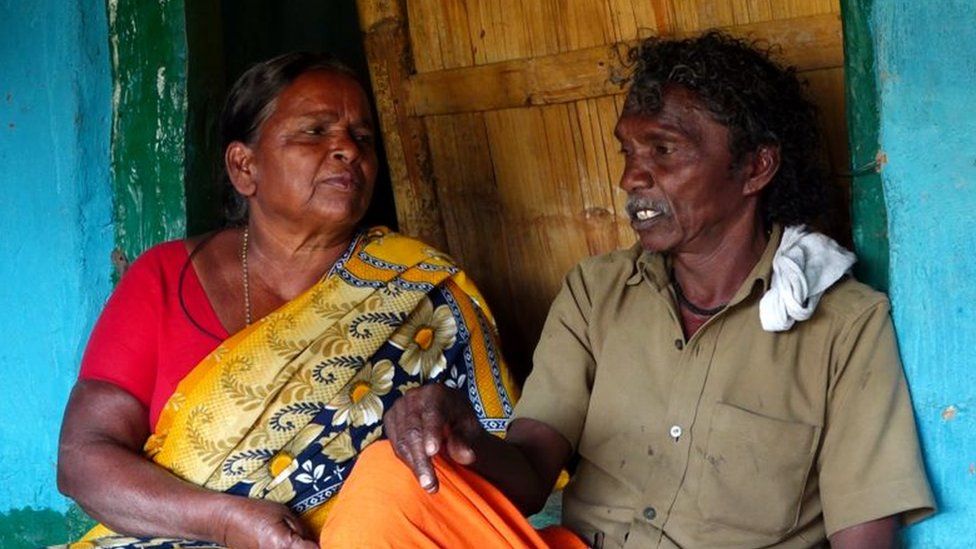
The couple sent a legal notice to the makers in June but it became public last month when they gave an interview to a YouTube channel.
The couple alleged that the makers made several promises to them at the time of the shoot which they failed to keep. This includes, buying them a house and providing financial support for participating in the documentary.
“Gonsalves met us and said she was going to make a short documentary on us. We had no idea that the film would win an award. We simply did what she said,” Bomman told BBC Tamil. “During the shoot, the director told us that she will build a house for us and get us a car.”
But when the couple checked their bank account, they realised they had not received the money, they alleged.
“We have not got anything except the 100,000 rupees given by the chief minister and a government job. Gonsalves did not fulfil her promises and she did not pay us either. She didn’t do anything for us,” Bomman said.
The couple also alleged they had to spend their own money to cover the expenses of the shoot and had lent a sum of 40,000 rupees to Gonsalves which she did not return – a charge she denied.
In their legal notice, a copy of which was accessed by BBC Tamil, Bomman and Bellie said they had not received fair benefits from the huge commercial gains made by Gonsalves, Monga and Sikhya Entertainment.
They added that their “skill, time and effort should be compensated proportionately at least after the roaring success of the documentary short film”.
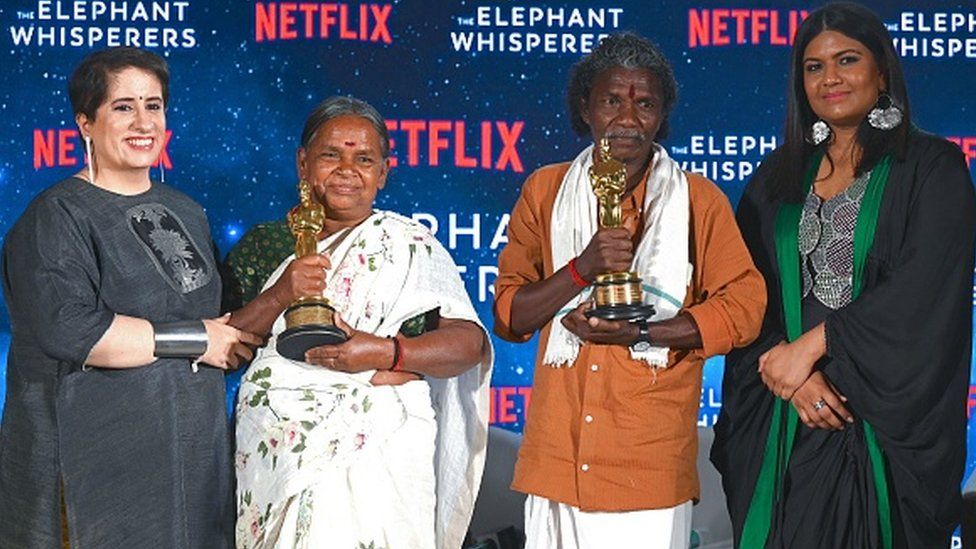
Last week, Gonsalves and Sikhya Entertainment issued a joint statement denying the allegations. “All claims made are untrue. We have a deep respect for all of the contributors of this story, and remain driven by the desire to create positive change,” they said.
In their statement to BBC Tamil, the makers added that the documentary raised awareness and had real impact on the community that took care of the animals. “The documentary’s success was a ‘moment of national pride’ that has brought widespread recognition for the work of mahouts like Bomman and Bellie,” they said.
This is not the first time Indian subjects of award-winning films have taken issue with its makers in the aftermath of the film’s success.
In 2021, directors Rintu Thomas and Sushmit Ghosh made a documentary on Khabar Lahariya, an all-women news service run mostly by editors and reporters from the most marginalised Dalit, Muslim and tribal communities.
The film was nominated at the 2022 Oscars. But a week before the ceremony, the media group distanced itself from the documentary, accusing the filmmakers of “distorting” its story – a charge the filmmakers denied.
BBC News India is now on YouTube. Click here to subscribe and watch our documentaries, explainers and features.

Read more India stories from the BBC:

Related Topics
King’s second son ‘Than Aon’ makes merit at Wat Yannawa
PUBLISHED : 10 Aug 2023 at 13:44

Vacharaesorn “Than Aon” Vivacharawongse, the second eldest son of His Majesty the King, made merit at Wat Yannawa in Bangkok’s Sathon district on Thursday, following his surprise arrival in Thailand on Sunday evening.
Vacharaesorn, 42, arrived at the royal temple on Charoen Krung Road with his friends. They were welcomed by Phra Tham Wachiramolee, abbot of Wat Yannawa, and Phra Khru Arthornprasittisophon, assistant abbot.
Many Thai and foreign media members waited in the temple compound to cover him. Thai people who heard about his visit flocked to the temple to welcome him.
Vacharaesorn lit a candle and incense sticks to pay respect to Buddha statues and then gave food offerings to 130 Buddhist monks and novices at the temple’s Dhamma learning school. The abbot then presented him with a replica of Phra Sampao Yannawa, a 16-inch Buddha statue.
Than Aon, fondly called by Thais, then went to the temple’s pier along the Chao Phraya River to make merit by releasing 1,000 fish into the river. He paid tribute to the monument of His Majesty King Nangklao (Rama III) before leaving the temple.
Vacharaesorn is on a visit to the kingdom after living abroad for 27 years.

Vacharaesorn Vivacharawongse offers food to a novice at Wat Yannawa in Sathon district, Bangkok, on Thursday. (Photo: Nutthawat Wichieanbut)
He reportedly departed from the John F Kennedy airport in the United States on Aug 5 on board a Cathay Pacific flight to Hong Kong, where he took a connecting flight that landed at Suvarnabhumi airport in Samut Prakan province on Sunday evening. It was reported that he would stay in the country for about a week.
Upon his arrival, he paid respect to the Supreme Patriarch at Wat Ratchabophit Sathitmahasimaram Ratchaworawihan in Phra Nakhon district on Monday morning and then paid homage to the City Pillar before moving on to Wat Phra Kaew, or Temple of the Emerald Buddha, and Wat Hong Rattanaram Ratchaworawihan.
He also visited a childcare centre for underprivileged children in Bangkok and donated necessary items to the centre.
Vacharaesorn, who holds both bachelor’s and master’s decrees in law from Stetson University College of Law in the US, is second of the four sons of His Majesty the King and his former consort Sujarinee Vivacharawongse. Their younger sister is Her Royal Highness Princess Sirivannavari Nariratana Rajakanya.

Vacharaesorn on Wednesday posted photos with children at the Foundation for Slum Child Care (FSCC) in Bangkok with a message “The value of heritage comes from its inheritors.” Great pleasure to support FSCC. (Photo: Vacharaesorn Vivacharawongse’s Facebook)

[embedded content]
Earthquake, tragedy & triumph – Japan to shine again?
| Date: Friday, 11 August Kick-off: 08:30 BST Venue: Eden Park, Auckland |
| Coverage: Watch live on BBC One from 08:00 BST, BBC iPlayer and the BBC Sport website & app. Listen on 5 Sports Extra and BBC Sounds. Live text, analysis and report on the BBC Sport website. |
“I was watching it on television at home,” Japan boss Futoshi Ikeda recalls when asked about memories of his nation’s 2011 Women’s World Cup triumph.
“The Japanese earthquake had just happened, so in that sense it was a tournament that gave everyone courage, and conveyed the joy and the greatness of sport.”
Japan’s momentous triumph in Germany 12 years ago was as emotional as it was unexpected.
Three months before the tournament, a devastating earthquake and tsunami along the country’s north-east coast killed more than 18,000 people, displaced tens of thousands and generated a tsunami which caused a nuclear meltdown at the Fukushima power plant.
The J-Village, Japan’s national football centre, was in Fukushima and became a place of refuge in the aftermath of the tsunami.
Japan defender Aya Sameshima was working at the nuclear plant at the time of the disaster and was recovering from the terrible events along with the rest of the squad which flew to Germany, including Saki Kumagai.
Aged 20 at the time, Kumagai struck the winning kick against the USA after the final had gone to a nail-biting penalty shootout at Frankfurt’s Waldstadion as the “Nadeshiko” – named after a delicate pink carnation – embodied the unbreakable spirit of a nation united in its battle to recover from disaster.
Twelve years on, Kumagai, 32, is Japan’s captain at the World Cup in Australia and New Zealand.
The Nadeshiko face Sweden, the nation they defeated in the semi-finals in 2011, in Auckland on Friday (08:30 BST kick-off) for a place in the last four.
“After we won the World Cup, a lot of girls started playing football,” Kumagai, who has played for her country since 2008 and is appearing at her fourth World Cup, said.
“Now the sport is less popular again and that’s not good. Our national team hasn’t won a lot recently and the Japanese people are less interested in the sport again.”
With Japan two wins from a third World Cup final in four attempts, will the class of 2023 go all the way and capture the hearts of the nation once again?
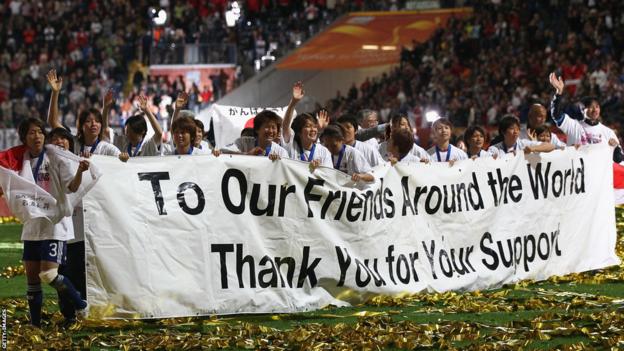
‘Japan look unstoppable’
Japan have slipped from fourth to 11th in Fifa’s rankings since they last appeared at a World Cup final in 2015, when the USA avenged their 2011 defeat by winning 5-2 in Vancouver, Canada.
But they are playing with a freedom and a spirit that has left some tipping them to lift the World Cup in Sydney on 20 August.
“They look unstoppable,” Eniola Aluko, the former England forward, said on ITV1 following Japan’s 3-1 win over Norway in the last 16.
“These players are at the height of their confidence – the chemistry, the flow, the timing. They are really looking like an unbeatable team. How do you stop Japan now?”
In a World Cup that has been unpredictable, Ikeda’s team have remained solid – and exciting.
They have scored 14 times in four matches – their most in a single edition of the tournament – to sweep aside Zambia (5-0), Costa Rica (2-0), Spain (4-0) and Norway (3-1).
While former winners the USA, Germany and Norway have made early exits, Japan have marched on.
In Hinata Miyazawa, they have the tournament’s leading scorer. Despite registering only six attempts on target, Miyazawa has five goals.
Forward Mina Tanaka has three assists to add to her two goals, goalkeeper Ayaka Yamashita has conceded once in four games, while only Spain’s Teresa Abelleira (17) has created more chances than 19-year-old Aoba Fujino (11).
Japan has nurtured generation after generation of talented players in the women’s game. Ikeda’s current crop are showing they have the potential to surprise after indifferent form leading up to the tournament, including defeat to Denmark.
“This team has changed minds [at this World Cup],” Midori Masujima, a prominent Japanese sportswriter, told the BBC World Football podcast. “We have a confidence which is good.”
‘I felt Japan smile’
More than a decade on, some 31,000 people remained displaced
“I felt the whole of Japan smile,” the tearful mother of Japan captain Homare Sawa told Fuji Television after the win in 2011.
Meanwhile, United States goalkeeper Hope Solo said of Japan’s victory: “I truly believe that something bigger was pulling for this team.”
Tearful Japan coach Norio Sasaki revealed he had used images of the disaster to help motivate his players during the tournament.
Sasaki, who left in 2016, is in New Zealand, where the Nadeshiko have played all four of their games, as part of Japan’s World Cup delegation.
On Thursday, current Japan boss Ikeda said support from back home was helping inspire his players at the World Cup.
“The people in Japan watching us on TV, this support is something we really feel,” added Ikeda, who was in charge of Japan when they won the Under-20 Women’s World Cup in 2018.
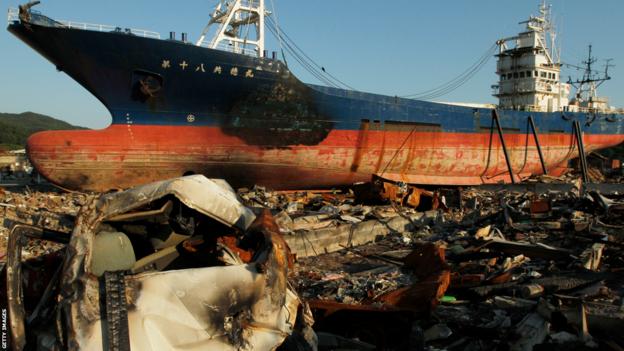
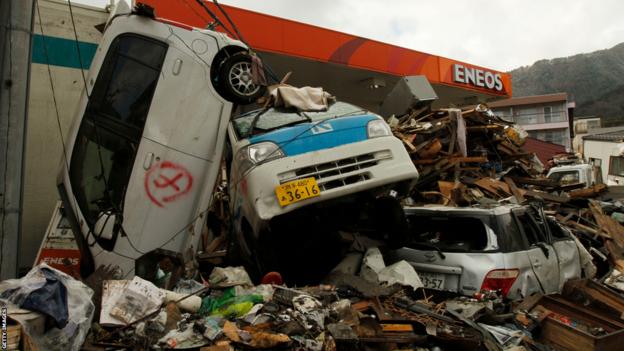
Top of the world again?
Ikeda has fully utilised his 23-player squad by starting 17 different players in Australia and New Zealand.
Only four have started all the games so far – including West Ham defender Risa Shimizu, who scored against Norway in the last 16.
A further three Women’s Super League-based players have appeared in Japan’s midfield at this tournament including Liverpool’s Fuka Nagano, Shimizu’s West Ham team-mate Honoka Hayashi and Manchester City’s Yui Hasegawa.
As a young teenager, Nagano was inspired by the 2011 World Cup triumph and, speaking in Auckland, said she and her team-mates fully believed that this year’s Nadeshiko will be able to match the feat.
“I was 13 years old or so,” Nagano, 24, recalled on Thursday. “Back then, I saw how the Nadeshiko played and that really empowered me, that’s what I remember about it.
“The Nadeshiko won the World Cup and we want to show Japan’s strength again at this tournament. We all believe that we can do it, and I think that’s what has brought us to where we are now.”
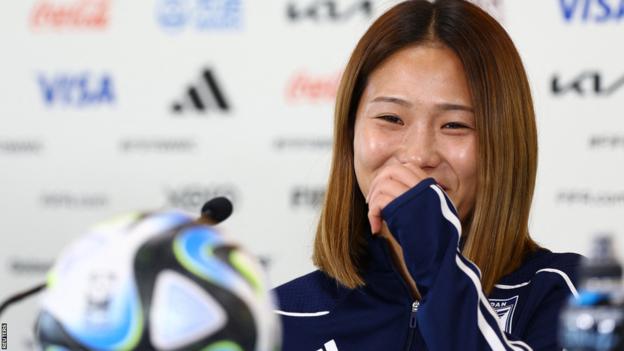
Asked what impact the 2011 World Cup win had on her growing up as a 14-year-old, Hasegawa said: “It was tremendous.
“It was something that had an unbelievably huge impact on Japan after the disaster. It [winning the World Cup] made me more determined to do the same thing one day.”
Will Hasegawa achieve her dream later this month?
“We want to fight hard every match and aim to reach the top of the world again,” added Ikeda.
US racing to close growing missile defense gaps

The US is racing to develop its next-generation homeland missile defense system as China, Russia and North Korea field new, sophisticated types of missiles capable of punching through existing US defenses.
This month, Breaking Defense reported that US defense contractors Lockheed Martin and Northrop Grumman are accelerating the Next-Generation Interceptor (NGI) development with plans to shave months off their earlier production schedule to develop a prototype by 2027.
A Lockheed Martin spokesperson said that the company has validated all the design elements of its Next-Generation Interceptors with the US Missile Defense Agency (MDA) on an accelerated schedule, according to the report. The spokesperson said Lockheed Martin has been consistently on track to deliver its prototype by 2027.
On August 7, Lockheed Martin announced that, following successful subsystem reviews, the company is gearing up for an “all up round” preliminary design review this quarter.
The report indicated the MDA will assess if Lockheed Martin’s designs are ready for the critical design review phase. For Northrop’s part, the company finished the systems requirements review three months ahead of schedule and is now aiming for a two-month preliminary systems review.
The Breaking Defense report notes that the move accelerates the critical design review process to the end of 2024 from early 2025. Breaking Defense also reported that Northrop has produced the initial batch of solid-fuel rocket cases for the program.
The report notes that these cases will be filled with inactive propellants and transported to Redstone Arsenal in Alabama, where they will be combined with an interceptor.
After that process, Northrop will continue pathfinder activities and further validate the process, noting that the interceptor will undergo further testing and process verification once the integration process is completed.
Patty-Jane Geller notes in a March 2023 article for the Heritage Foundation think tank that unlike the older Ground-Based Interceptor (GBI), which was declared operational in 2003, the NGI will include multiple kill vehicles to intercept multiple objects such as warheads and decoys coming from one missile.
Geller also notes that the NGI is designed as a single system explicitly for missile defense, in contrast to the GBI, which was rushed into service due to operational needs and employed parts initially designed for other missions, adding complexity to maintenance and upgrades.
Ultimately, Breaking Defense says the MDA plans to buy 20 NGIs starting in 2028 to augment the current GBI.
Asia Times notes that, as of 2021, the GBI is a significant component of the US Ground-Based Midcourse Defense (GBD), the only US system defending all 50 US states against a limited intercontinental ballistic missile (ICBM) attack from China, Russia or North Korea. China and Russia can credibly currently threaten the US while North Korea is actively developing ICBMs to break the logic of US extended deterrence on the Korean Peninsula.
China’s solid-fuel DF-31 ICBM family poses a severe strategic risk to the US. Missile Defense Advocacy Alliance (MDAA) notes that the modernized DF-31A variant, which entered service in 2007, is a road-mobile and silo-capable design with a projected range greater than 11,000 kilometers, giving it the potential to strike all areas of the US, Europe and Russia.
MDAA mentions that, unlike the older DF-31, the DF-31A conceals its warhead under a shroud and reportedly employs penetration aids, including at least eight decoy warheads.
It also says that a newer variant, the DF-31B, is reportedly under development. MDAA says that the DF-31 reduces the ICBM technology gap between the US, China and Russia, with its MIRV capabilities having the potential to defeat US missile defenses. That, in turn, may give China strategic cover against US intervention during a Taiwan contingency.
Similarly, MDAA notes that Russia’s RS-28 Sarmat, which was first commissioned in 2010, can strike targets 10,000 kilometers away with between 10-16 MIRVs and possibly 24 YU-74 hypersonic glide vehicles in the future.
MDAA notes that the RS-28 serves both symbolic and strategic functions for Russia, underscoring its status as a nuclear power on par or more advanced than the US, which is still belatedly modernizing its nuclear arsenal.
MDAA also notes that the RS-28’s capability to carry hypersonic weapons has the potential to make current-generation missile defenses such as the GBI obsolete.
Alexander Ward claims in a February 2023 article for Politico that North Korea may already have enough ICBMs to overwhelm US missile defenses, noting that it unveiled 10 to 12 Hwasong-17 ICBMs during a military parade that month.
Ward also mentions that the Hwasong-17 can theoretically hit the US from North Korea, although he says Pyongyang has yet to demonstrate that capability.
More pointedly, he notes that the US has just 44 GBIs to intercept a potential limited ICBM attack from North Korea, but if it can fit four MIRVs into each Hwasong-17, Pyongyang can launch more nuclear warheads than the US has interceptors.
Given China, Russia and North Korea’s missile advances, the GBD may no longer be an effective defense against ICBM attacks. In a September 2020 Breaking Defense article, Lockheed Martin explained why the long-serving system is overdue for a replacement, which it said is unfit to defend the US from ICBM threats from the 2030s and beyond.
Underscoring that fact is the GBD’s low success rate in testing. Missile Threat noted back in 2017 that out of 30 GBD tests since 1997, 17 of which were intercept tests involving a target ballistic missile, only nine of the 17 hit their mark, resulting in a success rate of just 53%.
Lockheed Martin notes that the most recent attempt to modernize the GBD was the Redesigned Kill Vehicle (RKV), initiated in 2015. However, the program was canceled due to engineering flaws resulting in multi-year delays and hundreds of millions of dollars in cost overruns.
Lockheed Martin says that reusing standard technologies that were not designed for space use has resulted in the need to overhaul completely most related flight systems.


